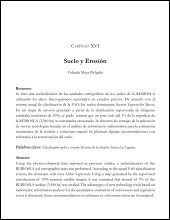Uso de humatos de vermicompost para disminuir el efecto de la salinidad en el crecimiento y desarrollo de albahaca (Ocimum basilicum L.)
Use of humates of vermicompost to reduce the effect of salinity on growth and development of basil (Ocimum basilicum L.)
Autor
JUAN JOSE REYES PEREZ
BERNARDO MURILLO AMADOR
ALEJANDRA NIETO GARIBAY
ENRIQUE TROYO DIEGUEZ
EDGAR OMAR RUEDA PUENTE
LUIS GUILLERMO HERNANDEZ MONTIEL
PABLO PRECIADO RANGEL
FELIX ALFREDO BELTRAN MORALES
FRANCISCO RODRIGUEZ FELIX
Metadatos
Mostrar el registro completo del ítemResumen
"Los bioestimulantes del crecimiento vegetal son sustancias naturales para el tratamiento de los cultivos como activadores de las funciones fisiológicas, por lo que su aplicación permite un mejor aprovechamiento de los nutrientes y representan una opción adecuada para enfrentar problemas de estrés abiótico por salinidad. El objetivo del presente estudio fue determinar el efecto del humatos de vermicompost como atenuante de la salinidad en el crecimiento y desarrollo de plantas de dos variedades de albahaca (Ocimum basilicum L.), una tolerante y una sensible a la salinidad, las cuales se sometieron a tres concentraciones de NaCl (0, 50 y 100 mM) y a la aplicación de humatos de vermicompost con dos diluciones (0 y 1/60 v/v) en un diseño completamente al azar con seis repeticiones. El trabajo se desarrolló en una casa malla sombra y se midió longitud de tallo y raíz, biomasa fresca y seca de raíz, tallo, hoja y el área foliar. Los resultados mostraron que la variedad Napoletano en 0 mM de NaCl y la disolución de 1/60 (v/v) de humatos de vermicompost fue la de mejor respuesta en todas las variables medidas, mientras que los valores inferiores los presentó la variedad Sweet Genovese en 100 mM de NaCl. Se discute la respuesta diferencial entre las variedades al someterlas a diferentes niveles de NaCl y la aplicación de humatos de vermicompost." "Plant growth bio-stimulants are natural substances to treat crops as activators of physiological functions, so its application allows a better use of nutrients and represent an appropriate option to address problems of abiotic stress by salinity. The aim of this study was to determine the effect of humates of vermicompost as attenuating of salinity in growth and development of two varieties of basil (Ocimum basilicum L.), one tolerant and one sensitive to salinity, which underwent three NaCl concentrations (0, 50 and 100 mM) and the application of humates of vermicompost with two dilutions (0 and 1/60 v/v) in a completely randomized design with six replications. The work was developed in a greenhouse and stem and root length, fresh and dry biomass of root, stem, leaf and leaf area were measured. The results showed that Napoletano variety in 0 mM NaCl and the dissolution of 1/60 (v/v) humates of vermicompost was the best response in all variables measured, while lower values were for Sweet Genovese in 100 mM NaCl. The differential response between varieties when subjected to different levels of NaCl and application of humates of vermicompost is discussed."
Colecciones
Ítems relacionados
Mostrando ítems relacionados por Título, autor o materia.
-
PROMOCIÓN DEL PERIFITON PARA EL CULTIVO DE CAMARÓN BLANCO: HACIA UNA ACUICULTURA ECOLÓGICA
DOMENICO VOLTOLINA LOBINA; JUAN MANUEL AUDELO NARANJO; MARIA DEL ROSARIO PACHECO MARGES -
Suelo y Erosión
YOLANDA LOURDES MAYA DELGADO


